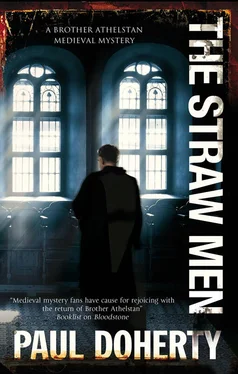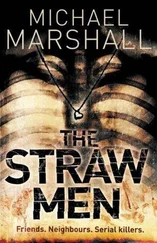Paul Doherty - The Straw Men
Здесь есть возможность читать онлайн «Paul Doherty - The Straw Men» весь текст электронной книги совершенно бесплатно (целиком полную версию без сокращений). В некоторых случаях можно слушать аудио, скачать через торрент в формате fb2 и присутствует краткое содержание. Год выпуска: 2012, Издательство: Creme de la Crime, Жанр: Исторический детектив, на английском языке. Описание произведения, (предисловие) а так же отзывы посетителей доступны на портале библиотеки ЛибКат.
- Название:The Straw Men
- Автор:
- Издательство:Creme de la Crime
- Жанр:
- Год:2012
- ISBN:нет данных
- Рейтинг книги:5 / 5. Голосов: 1
-
Избранное:Добавить в избранное
- Отзывы:
-
Ваша оценка:
- 100
- 1
- 2
- 3
- 4
- 5
The Straw Men: краткое содержание, описание и аннотация
Предлагаем к чтению аннотацию, описание, краткое содержание или предисловие (зависит от того, что написал сам автор книги «The Straw Men»). Если вы не нашли необходимую информацию о книге — напишите в комментариях, мы постараемся отыскать её.
The Straw Men — читать онлайн бесплатно полную книгу (весь текст) целиком
Ниже представлен текст книги, разбитый по страницам. Система сохранения места последней прочитанной страницы, позволяет с удобством читать онлайн бесплатно книгу «The Straw Men», без необходимости каждый раз заново искать на чём Вы остановились. Поставьте закладку, и сможете в любой момент перейти на страницу, на которой закончили чтение.
Интервал:
Закладка:
‘Jesus Lord, welcome thou me
In form of bread as I see thee
Jesus, for thy holy name,
Shield me today from sin and shame.’
He opened his eyes. Cranston, despite his bulk and swagger, had come quietly up beside him and was now staring at him curiously.
‘Sir John, I am ready.’
They left the enclosure, going up the alleyway to the main lane leading down to London Bridge. Flaxwith, Cranston’s principal bailiff, together with his mastiff, which Athelstan secretly considered to have the ugliest face in London after its owner, were waiting, swaddled in their heavy cloaks. Flaxwith, along with other members of Cranston’s comitatus , had cornered a relic-seller, who bleatingly introduced himself as ‘John of Burgundy’, more popularly known as ‘Bearded John’. This counterfeit man owned a little fosser of blue and black satin holding what he proclaimed to be the most holy relics, including a finger of one of the Holy Innocents and a bone of one of the Eleven Thousand Virgin Martyrs of Cologne, as well as a piece of rock from where God met Moses. The relic-seller, eyes bright in his chapped face, babbled like a babe. Cranston heard his patter then thrust the fosser back into the man’s trembling hands.
‘John of Burgundy, be gone,’ the coroner whispered, pushing him away. ‘Today, we hunt greater prey.’
‘I did hear. .’ Bearded John babbled.
‘Yes, yes, I’m sure you did.’ Cranston thrust him out of the way and continued on. Athelstan had to hurry to keep up. He felt like reminding the coroner how he would like to know what was happening but the noise and bustle of the streets made that impossible. The snow clouds had broken and a weak sun had brought out the crowds. For the last few days the grey, icy frostiness had stifled trade and imprisoned people in their chambers and garrets. Now, even this mild change in the weather had enticed them out. Everybody wanted to trade, sale, buy, beg or steal, not to mention visit the cook shops, wine booths, alehouses and taverns. An enterprising leech had set up shop close to Sweet Apple Court, a name Athelstan considered to be the most blatant lie in Southwark as the enclosure was as filthy and stinking as any piggery. Nevertheless, in spite of the reeking odours, the leech had gathered a crowd, assuring all and sundry that if they adjourned to his chambers in nearby Firkin alley, he would examine their urine and let a little blood. Afterwards he would provide them with his miraculous elixir, the cheapest sort containing cloves, nutmeg, mace and similar ingredients; the more expensive, ‘for the more discerning’, would be made up of ambergris, juniper and white frankincense. Athelstan, bemused, shook his head, constantly surprised at the sheer gullibility of the human heart. He walked on cautiously. The ground underfoot was frozen, the rutted ice covering the filthy slops and congealed mud. Athelstan murmured a prayer for safety to St Christopher as he dodged sumpter ponies, high-wheeled carts and lumbering oxen. A stiff river breeze blew a cauldron of smells and odours, a rich stew of fish, spices, fried meat and freshly baked bread along with the stench of animal dung and human waste. The ever pervasive, bitter tang of saltpetre made Athelstan gag. The saltpetre was thrown along the lanes to mask rank odours till the lay stalls, crammed with frozen refuse, were emptied by the dung carts. The scavengers who manned these were now busying to clear the mess left to rot during the previous week’s snow storms. Beadles patrolled the streets, screaming at householders not to empty jakes’ pots. One beadle had been rewarded for his efforts by receiving the entire contents of two night jars over him, and now he and his colleagues were battering at the door of the citizen responsible, determined on punishment.
The dead were also being buried. The break in the weather meant requiems could be sung, graves hacked out of the iron-hard ground and mourners allowed to provide their beloved departed with the appropriate religious farewell. Coffins bobbed on shoulders or bounced in hand carts as mourners, preceded by a priest pattering the psalms, led funeral processions to this chapel or that cemetery amidst the fiery glow of candles, lantern boxes and torches. Gusts of incense sweetened the air. The throng of citizens divided to allow the dead to pass before the crowds closed again, surging in every direction. Athelstan could only murmur his own prayers and keep his hands, freezing cold despite the woollen mittens, tightly on his writing satchel. The tribe of filchers, nips and foists were out, eager for plunder, hunting the swinging purse or loosely hung wallet. Cranston was recognized. Insults were hurled when the ‘parishioners of the devil’, as the coroner called them, fled up alleyways and runnels. At last they approached the bridge, though this was fast becoming a battleground involving a group of scavengers clearing the dirt. They had clashed with street hawkers, hucksters and chapmen who insisted on taking up their position with their baskets of eggs, butter, cheese, brushwood and heather ‘fresh from the countryside’. A group of fish wives from Billingsgate, their thick leather aprons encrusted with blood, had joined the fray equally determined to sell their eel tarts, fish pies, oysters and mussels. The air was riven with curses and obscenities hurled backwards and forwards. The tumult had blocked the approach to the bridge. Cranston barked out an order. Flaxwith brought out a hunting horn from beneath his cloak and blew strident blasts before bellowing at the top of his voice that everyone was to keep the King’s peace and step aside for the Lord High Coroner. The tumult subsided. As the brawlers dispersed into the shadow of the overhanging houses, Cranston swept on. Once he had passed, the tumult began again. Athelstan heaved a sigh of relief as he glimpsed the bridge’s high gates and towers as well as the cornices, sills and steeple of the Priory of St Mary Overy. They had to pause for a while as an execution party made its way down to the gallows — three wolfsheads who’d escaped from sanctuary at the priory and been wounded during the affray. Each had been summarily tried, condemned and loaded into wheelbarrows, commonly used to collect dung, and were now being taken from the Compter Clink to the riverside gallows. Athelstan blessed each of the groaning men then passed on to the bridge through the cavernous gate, its curving rim spiked with the boiled heads of traitors.
They made their way along the narrow lane between the houses and shops, which rose above them, leaning over to block out the sky. Beneath them echoed the thunderous roar of the river as it crashed against the starlings protecting the pillars of the bridge. Athelstan was sure the bridge was moving; as always, he tried to distract himself while keeping a wary eye on the ground beneath. A cluster of eel stalls stood at the near end of the thoroughfare and the discarded skins made the lane more slippery than ice. Athelstan glanced to his left and right. He was always fascinated by the apparent wealth displayed by the stalls and shops along the bridge. Some of the costliest items in London could be purchased here. Cloths and fabrics from Constance, Tournai and Rouen. Canvas from Westphalia and silver thread from Cologne were sold alongside amber and bone beads, ivory combs, silk girdles, brass rings, leather hats and hand mirrors of steel, crystal and jasper. Apprentice boys loudly proclaimed the virtues of buckram, silk, sarcanet, lawn and dyed wool. Jewellers and goldsmiths offered diamond necklaces, buckles and girdles, precious stone paternosters, mazer cups, silver gilt goblets and salt cellars, as well as spoons of every precious kind studded with gems or embroidered with gold or silver tracery. Another stall, manned by three clerks, ‘learned in the halls, schools and Inns of Court,’ offered to write or copy letters, deeds, leases, memoranda or bills of exchange. Between life-size statues of St Catherine the Virgin and St Nicholas of Colenso, the haberdashers of the hat, haberdashers of the small wares and ironmongers offered kerchiefs embroidered with religious devices, pyxes or kissing boxes, night-time laces, pepper mills, girdles and pouches, the latter adorned and embroidered with silver clasps. At Becket’s shrine in the centre of the bridge, merchants met bankers before going into the chapel either to seal documents at the altar or pass money over. All this was recorded by the chapel’s clerks in a leather-bound book of debts kept in an iron chest beneath the relic stone; this made repayment a matter of faith not just business. In the stocks next to the chapel, a vintner, found guilty of mixing cobbler’s wax with the dregs of his wine, was sitting with his legs firmly clasped. The disgraced merchant was being forced to drink a draught of his own adulterated beverage. A market beadle slowly emptied another jug over the unfortunate man’s head while a second beadle loudly proclaimed, ‘That Richard Pemrose, vintner, could do no further trade in wine or any other commodity for a year and a day’. Beside Pemrose sat an imprisoned cook’s apprentice from a nearby pie stall. He had sold pies and patties stuffed with the flesh of hen, goose, duck, lark and fish, but he’d also plucked at the costly gowns of passers-by and so, as the notice around his neck proclaimed, ‘damaged their clothes with hands dirtied and fouled’. Cranston paused to take a drink from his wine skin. He offered this to Athlestan, who refused even as he shook off the grasp of a chapman eager to sell him a trinket.
Читать дальшеИнтервал:
Закладка:
Похожие книги на «The Straw Men»
Представляем Вашему вниманию похожие книги на «The Straw Men» списком для выбора. Мы отобрали схожую по названию и смыслу литературу в надежде предоставить читателям больше вариантов отыскать новые, интересные, ещё непрочитанные произведения.
Обсуждение, отзывы о книге «The Straw Men» и просто собственные мнения читателей. Оставьте ваши комментарии, напишите, что Вы думаете о произведении, его смысле или главных героях. Укажите что конкретно понравилось, а что нет, и почему Вы так считаете.












